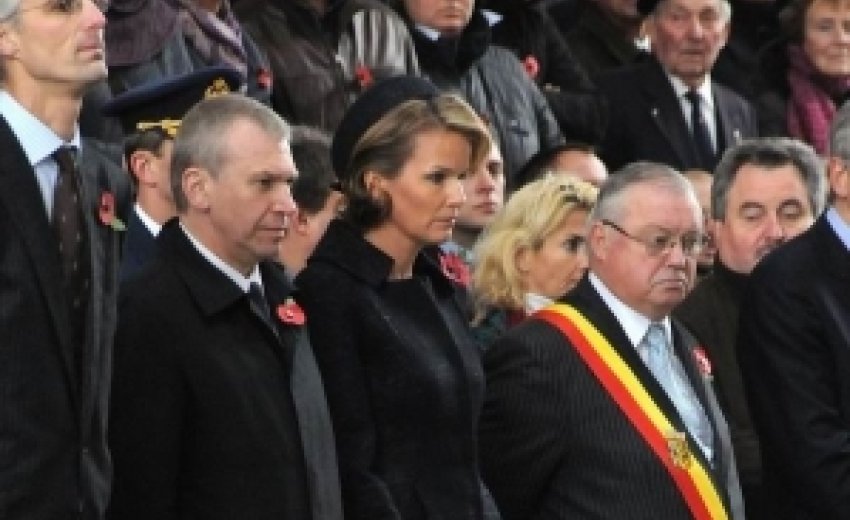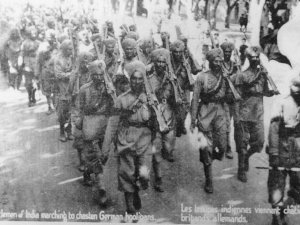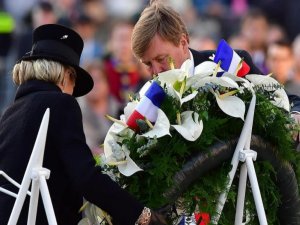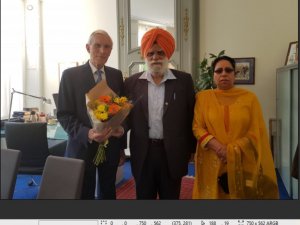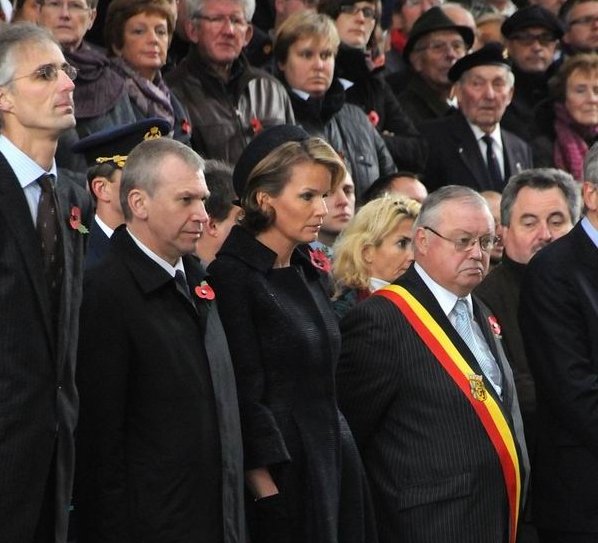 |
| Queen of Belgium and Governor of Flanders(where Sikhs fought twice in WW1) Mr. Paul Breyne are attending Remembrance Day in Ieper 11-11-2011 |
At a time when social scientists claim that in reality, the ethical society is located in the West, it is time that it pays attention to what the Sikhs have done for the construction of that part of the world. The Sikhs came forward and helped the Europeans at the time of grave crisis of World War I and II and gave their lives in thousands and in return, all they are asking is the free world to come forward and give due respect that we deserve and to our symbols of faith.
 The forces of British India played a major role in both World Wars. Nearly 1,700,000 men and women of the Commonwealth including some 169,700 from the forces of undivided British India died in the 1914-18 and 1939-45 Wars. In the first World War, the strength of the British Indian Army rose to one million and in the 2nd World War with two and half million. During WW-1, it fought in China, France and Belgium-Flanders at Ypres twice from 22 October 1914 till 31 October 1914 and from 22 April 1915 till 1st of May 1915, La Bassee, and Neuve Chapelle from 10 to 13 marches 1915, Auber's Ridge, Festubert, Loos 25 September 1915, Givenchy and Somme from July 1916 to November 1916. Mesopotamia against Turkey, Iraq, Iran, Egypt, Palestine, Gallipoli and in East Africa.
The forces of British India played a major role in both World Wars. Nearly 1,700,000 men and women of the Commonwealth including some 169,700 from the forces of undivided British India died in the 1914-18 and 1939-45 Wars. In the first World War, the strength of the British Indian Army rose to one million and in the 2nd World War with two and half million. During WW-1, it fought in China, France and Belgium-Flanders at Ypres twice from 22 October 1914 till 31 October 1914 and from 22 April 1915 till 1st of May 1915, La Bassee, and Neuve Chapelle from 10 to 13 marches 1915, Auber's Ridge, Festubert, Loos 25 September 1915, Givenchy and Somme from July 1916 to November 1916. Mesopotamia against Turkey, Iraq, Iran, Egypt, Palestine, Gallipoli and in East Africa.
The Royal Indian Marine whose ships were armed in 1914 served with the Royal Navy as auxiliary cruisers on escort duties and others as river gun boats in the Mesopotamia campaign or as coastal minesweepers. The Royal Indian Marine was also responsible for the fitting out and dispatch of the vessels conveying the expeditionary forces sent overseas from British India.
There are 15,519 Burial place ( Smaads ) of the British Indian soldiers and 64,963 are commemorated by Memorial thus total of 80,482 have died in Ist World War (1914-18) according to the register of Common Wealth War Grave Commission.
But I am sure there are many more British Indian casualties whose names were never recorded and who are by consequence not commemorated. I think this is due to the battle circumstances and perhaps poor administration. I give you some examples:
Mr. Dominiek Dendooven from the Documentary Center of In Flanders Fields Museum, Ieper (Belgium) wrote his account to me, in view of some historical facts that the Documentary Center has preserved regarding the Western Front.
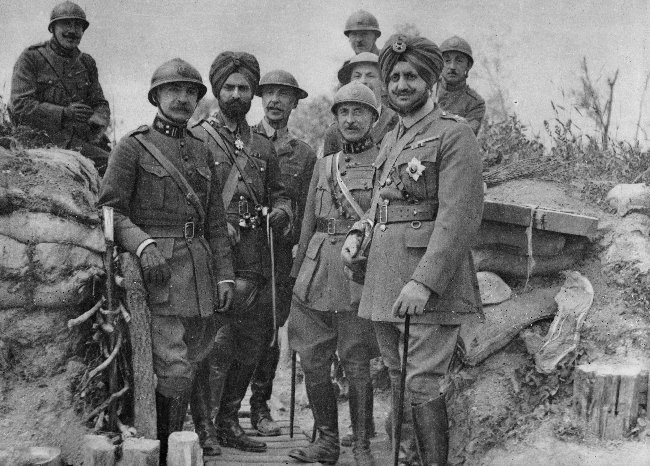 |
| Maharaja of Patiala Lt. Gen.Bhupinder Singh with Belgium Generals on the frontline of Belgium in april 1915 |
"The losses of the 57th Wilde's Rifles and the 129th Baluchis were great during the last two days of October 1914 (during the 1st battle of Ieper). The Wilde's Rifles lost 300 out of 750, the Baluchis had 240 men killed, wounded or taken as POWs.
The Menon Gate in Ieper has the name of 15 casualties from the 47 Sikh Regiment while alone on 27 April 1915 (during the 2nd Battle of Ieper) out of 444 men 348 did not come back. They are nowhere else commemorated. Between 24th April and 1st May 1915, the Lahore Division had lost 3,889 men, or 30 % of the troops it had employed."
In 14 months the Indian Corps had lost 34,252 men (dead, wounded, ill, or prisoners of war) on the Western Front."
Basra Memorial, Iraq has the largest 33,367 British Indian soldiers Commemoration by Memorial followed by Delhi Memorial, India Gate (12,321), Neuve Chapelle Memorial, France (5015)
Amara (Left Bank) Indian War Cemetery, Iraq has the largest Burials (Smaads) of British Indian soldiers (5000) followed by Baghdad (North Gate) War Cemetery (2513) and Mazargues War Cemetery, France (1002)
 |
| Monument built in april 1999 to mark 300 years of Khalsa in Hollebeke Where the Sikhs fought for the first time against Germany in October 1914 |
In 2nd World War, a company of the Royal Indian Army Service Corps was part of the British Expeditionary Force in 1940 campaign which ended in the evacuation from Dunkirk (France). Divisions of British Indian Army fought in the Western Desert, in the Middle East, in Eritrea, Ethiopia, they fought in Italy at Cassino, Florence, Forli, Ravena, Sangro River and took part in the liberation of Greece. But against Japan in the east, British Indian Army played its greatest role right through from the reverses of 1942 to the final overwhelming victory of 1945.
Till 1945, the Royal Indian Navy was a strong force of 28,000 officers and men and took part in action in the Red Sea, the Indian and Atlantic Oceans, the Bay of Bengal and the Mediterranean, also in the combined operation of the coast of Sicily and Burma. Their role in transporting the armies and essential supplies even to the civilian populations cannot be forgotten.
Royal Indian Air Force played its role from the beginning of 2nd World War (1939) with one squadron and strength of 200 officers and men. It had grown by 1945 to strength of 28,500 and nine squadrons. It saw action throughout the Burma campaign. British Indian officers also served in the Royal Air Force in Burma, Europe and other theatres.
 |
| Forli munument 1 |
To honor 300 years of Khalsa and the sacrifice of Sikh soldiers during World Wars, the City of Ieper together with the European Sikh Community organized a Celebration of Peace on Sunday 4 April 1999 at Cloth Hall in Ieper, Belgium.
Flt. Lt. Mohinder Singh Pujji, a pilot of Royal Air Force who took part in the European campaign was honored along with several living soldiers of World War II by Governor Paul Brijn of Inflanders Province. Flt. Lt. M.S. Pujji has stated, "I was posted to No.253 Squadron RAF, flying Hurricane IIB fighters from RAF Kenley, which is a couple of miles south of Croydon. We were a mixed bunch, with pilots also from Poland, America, Canada and Australia. Equipped with twelve machine guns, our hurricanes were extensively flown day and night, to intercept German bombers and reconnaissance aircraft."
There are 12,830 graves (Smaads) of the British Indian soldiers and 76,388 are commemorated by Memorial, thus total of 89,218 have died in 2nd World War (1939-45).
Delhi Memorial, India has commemorated 22,838 soldiers followed by Rangoon Memorial, Burma (19,661) and Singapore Memorial, Singapore (12,100).
Taukkyan War Cemetery, Burma has graves (Smaads) of 1,819 British Indian soldiers followed by Imphal Indian Army War Cemetery, India (809) and Kranji War Cemetery, Singapore (668)
 |
| Forli Sikh Monument built in Italy 13 august 2011 by Italian Sikhs in memory of Sikhs martyres of WW2 2 |
Engraved on the graves of Sikh soldiers is Ik Oankar Siri Waheguru Ji Ke Fateh Sanskare Gaye in Gurmukhi. Sepoy number, full name, name of the regiment, and date of death are all printed in block letters in English. These Smaads of the Sikhs can be found across Europe, Middle, South & Far East Asia and Africa. They are well maintained, cleaned, and decorated by Commonwealth War Grave Commission.
Similarly, most Hindu soldiers are Gorkhas, and engraved on their graves in Sanskrit are the words, Oom Bhagwattee Nammo. Rest of the particulars are the same. In the same way, our Muslim brothers have the holy words from Qur'an written in Urdu on their graves with all the particulars mentioned above.
India has the largest number of British Indian soldiers 49,285 Buried - Cremated and Commemorated on Memorials and other countries are: Iraq (43848), Burma (22,932), Singapore (13,556), France (8886), Egypt (8171), Italy (5773), Iran (3471), Tanzania (1990), and Turkey (1742).
As I said earlier that the actual number is much more than has been recorded by Common Wealth War Grave Commission. Research is needed by Government of west Punjab (Pakistan) and by Government of east Punjab (India) as most of the casualties are from united Punjab. Hence the recorded history of British Indian soldiers who died in both Wars is :
Ist World War (1914-1918) = 80,482 2nd World War (1939-1945) = 89,218 Total : = 169,700 Besides this, more than quarter of a million were wounded, ill, or prisoners of war.
"In the last two world wars 83,005 turban wearing Sikh soldiers were killed and 109,045 were wounded. They all died or were wounded for the freedom of Britain and the world, and during shell fire, with no other protection but the turban, the symbol of their faith." (General Sir Frank Messervy K. C. S.I, K. B. E., C. B., D. S. O.) "The Sikh Regiment in the Second World War" Colonel F T Bird Wood OBE Published in Great Britain by Jarrold and Sons Ltd., Norwich Foreword by General Sir Frank Messervy K. C. S.I, K. B. E., C. B., D. S. O.
Most of the People in Punjab do not know that their forefathers, the Sikhs have fought gallantly in Europe including Italy in the 2nd World War and played an important role for the liberation of Europe and paid heavy price for the freedom of mankind along with Allied forces as part of the forces of the Commonwealth. The total Allied casualties killed, wounded and missing were 312,000; of these, 42,000 of the killed belonged to the forces of the Commonwealth in Italy. Sikhs, Gorkhas, and Muslims, the traditional warriors has a great history in Italy during that terrible and painful period of war.
It is interesting to note that in Italy, Sikhs are living in large number ( about 90,000 ) next to England in Europe and have established more than two dozen Gurdwara's there.
A tradition has been set up that every year on the November 11 (Armistice Day 11 November 1918), hundreds of Sikhs are coming from throughout Europe to Ieper to take part in the Poppy parade and pay homage's at Menon Gate, the national monument of World War-I in Belgium and at Hollebeke where a monument has been built by Belgium Government and inaugurated by 'Panj Piare' in memory of the Sikh soldiers to mark the celebration of peace on 2,3,4 of April 1999 dedicated to the 300 years of the birth of the Khalsa. Official invitations are being sent to Gurdwara's of Belgium, Holland and France every year. Last year a delegation of the Sikhs working for the British Police also visited this place. Free meal (Langer) is also served on this occasion.
Graves (Smaads) are visited by the families of these soldiers from Punjab, Europe, Canada, USA, and Great Britain. Since 1999, on May 4, the liberation day of Holland, a strong delegation of Sikhs also pays respect in Amsterdam at the National Monument of 2nd World War at Dam square.
As you must be aware, in March 2004 a law was passed in France that bans conspicuous religious symbols and attire in the classroom. Under this law, Sikh schoolchildren are banned from wearing the Sikh turban. The same people who fought for the freedom of mankind and the world including France have been denied their right of freedom. They all died or were wounded for the freedom of Britain and the world, and during shell fire, with no other protection but the turban, the symbol of their faith. A Sikh's right to wear his articles of faith has been challenged in schools, the workplace, Prisons and other public places. Sikhs suffer increased harassment at airports because they wear the Turban. Sikhs can't have their photos with Turban on the Driving license, Identity Card including French Passport. Is not a shame on part of the French Government? Our forefathers did not give their lives that their children should suffer. This is a great unjust ice and Sikhs throughout the World, especially in France are fighting a legal battle.
On 31 May 2006 Sikhs Lobby MEPs Against Turban Ban in France in the EU Parliament. And the fact that we cannot and will not ever compromise our faith.
The Sikhs came forward and had helped the Europeans at the time of grave crisis of World War I and II and gave their lives in thousands and in return we the Sikhs are only asking the free World to come forward and give due respect that we deserve and to our symbols of faith. Only then the sacrifices of our great forefathers, given for the freedom of mankind, will be worthwhile.
We have now 2 Sikh monuments ( Ieper Belgium 3 April 1999 ) and Forli - Italy ( 13 August 2011 ) and the Video links below will show the Inaguration of these historical Events.
https://www.youtube.com/watch?
https://www.youtube.com/watch?
https://www.youtube.com/watch?
https://www.youtube.com/watch?
https://www.youtube.com/watch?
 About the Author About the AuthorSardar Bhupinder Singh Holland was born in Amritsar, the city founded by Guru Ram Das Sahib. He is a proud alumnus of Khalsa College, Amritsar (1967 -1973) where he graduated with B.Sc and B.Ed degrees. For the term 1967-1968, he was declared the best football player. He was honoured by Khalsa College in 2008. Sardar Bhupinder Singh lives in the Netherlands since 1973 where he worked for the International computer firm IBM Nederland's for more than three decades as Accounting Analyst. Sardar Bhupinder Singh has made significant contribution to the Sikh cause in Europe. As a Sikh missionary, social worker and public leader, he is among the most prominent Sikhs of the Europe. He has earned several awards including the Ambassador for Peace for his contribution to the Dutch society, especially the Sikhs and has been honoured by many Sikh organisations and Gurdwara's around the world. He is chief of ISYF (Holland Unit), World Sikh Writers Conference (Holland branch), member Siri Nankana Sahib Foundation. In 1996, he began research work on the Sikhs' sacrifices during the two world Wars. He collected precious information and rare photographs most of which was hitherto not known to the world. These two works are a sort of mini archive of the Sikhs. These two books earned name and fame for him and he received special commendations from the scholars, statesmen and others. Both the works are historical, precious and priceless. His 3rd work is history of the Dutch Sikhs. Like his other works, he has made this work too as museum and archive of the Sikhs of Holland. A Sikh home in Europe, without this treasure, will be considering as incomplete house. For his work and contribution to Sikh Cause, Sardar Bhupinder Singh Holland has been honoured by Jathedar Avtar Singh, President, Shromani Gurdwara Committee, Siri Amritsar in January 2008. The Books are : o How Europe is indebted to the Sikhs, Role of Sikhs in Europe during World War One 1914 - 1918. Sikh University Press, Belgium. 1st edition 2005 and 2nd edition 2009. o How Europe is indebted to the Sikhs, Role of Sikhs in Europe during World War Two 1939 - 1945. Sikh University Press, Belgium. 1st edition 2007 o The Dutch Sikhs - A Brief History. Sikh University Press, Belgium. 1st edition 2009. |

